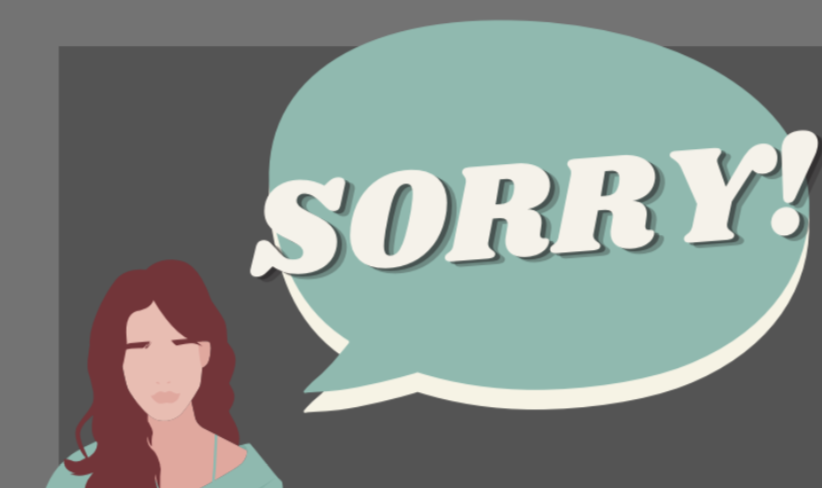Writer examines her need to apologize
I’m sorry, but I’m what you might call a serial apologizer. You bump into me? Whoops, no, that’s my fault. I missed your call because I was at a doctor’s appointment? I am SO SO sorry. How rude of me!
During my sophomore year in college, Becki Scola, Ph.D, associate professor and chair of the political science department, encouraged the women in our class to stop apologizing for simply sharing our thoughts on class material.
Although I’ve taken multiple courses with Scola over the past three years and stopped apologizing in her classroom, I’m not sure I’ve gotten that much better elsewhere (sorry, Dr. Scola). So, I decided to spend two weeks taking notes on my apologies to try to understand why I persist with the sorries.
I confirmed what I suspected: I over-apologize because I want to make myself more palatable for others. Let’s be honest, confident women can, and do, scare people off, and I seem to have internalized that.
My “sorries!” are also a social self-defense mechanism when I’m uncomfortable, like when I apologize to a man for interrupting me in class (yes, I did that last week).
Deborah Tannen, Ph.D., professor of linguistics at Georgetown University, is an expert on the relationship between gender and language. Among her many books is the 1990 classic, “You Just Don’t Understand: Women and Men in Conversation.”
Tannen told me that apologies from women get snared in gender bias—and it’s complicated.
For example, if women in the workplace talk in a manner that people expect (they are apologetic, accommodating), they’re likely to be accepted in that space. But, they’re also likely to be seen as less competent and confident. Yet, if women talk in ways expected of a leader (commanding, assertive) they may be seen as too aggressive.
“Women’s use of ‘I’m sorry’ still is often interpreted as ‘she thinks everything’s her fault. She’s lacking in confidence,’” Tannen said. “So in a work situation, it might not be a bad idea for women to try to roll that back a bit. But you have to be careful because if you don’t talk in ways expected of women, people often have a negative response.”
One recent afternoon in my Black Women Writers class with Aisha Lockridge, Ph.D., associate professor of English, we were discussing “Old Country” by Roxane Gay. I related to the story, and given that this is a participation-based course, I wanted to share my thoughts. But by the third or fourth time I raised my hand, I was prefacing my comments with, “Sorry I keep talking so much!”
I’ll be honest: I wasn’t sorry I kept talking. I really enjoyed the story, and I really wanted to talk about it. But, I worried I was bothering my classmates and professors with my comments. (Lockridge stopped my apology and told me to keep going.)
I apologize most frequently when I’m in an academic or professional setting. But, I also use my “sorries” quite liberally without thinking, like when I’m running for a door someone’s holding open for me or I’m turning a corner in the hallway and come a little too close to someone.
Tannen said this use of an apology is common.
“On the one hand, it is often ‘I’m sorry that happened,’ and on the other hand, it is just an automatic knee jerk filler like ‘like, you know, um and uh’ that people just throw in,” Tannen said.
Karina Schumann, Ph.D., professor of psychology at the University of Pittsburgh and author of the 2010 study “Why women apologize more than men: gender differences in thresholds for perceiving offensive behavior,” said while apologies are important to use as a conflict-resolution strategy, women could still benefit from reframing their language.
This can be as small as changing a “sorry” in an email to “thank you for your patience,” which Schumann said she has begun to implement in her own life.
“I might suggest that women become more mindful of their apology behavior, more thoughtful about it, and to pay attention to what they apologize for and don’t apologize for,” Schumann said. “There are other things that we can do to engage in polite communication with others without it having to be an apology.”
Over the past two weeks, I started omitting “sorry” in an email or as a follow-up anytime I shared my thoughts in certain classes. Replacing an “I’m sorry” with a statement of gratitude (like, “I really appreciate your time”) has helped me feel more confident without feeling as though I’m unkind or unlikeable.
Like me, Darynn Minus-Vincent ’23, a self-defined “people pleaser” and “apologetic person,” said she has started to reflect on her use of an apology, mostly in social settings.
“I think ‘Well, why do I need to explain myself to them? Why do I need to apologize?’ I don’t necessarily owe people anything,” Minus-Vincent said.
But maybe Minus-Vincent and I are not the problem. Why can’t others shift the way they think about the way women apologize?
“Women are often told ‘don’t apologize, It’s not your fault.’ But often, when women say ‘I’m sorry,’ it’s not an apology. It’s, ‘I’m sorry that happened,’” Tannen said. “But it’s often interpreted as something internal: ‘She thinks everything’s her fault.’”
I often apologize to express empathy, like when someone tells me they got only three hours of sleep and I hit them with the classic “Ah, I’m sorry, that’s always the worst!”
The burden to reframe apologies shouldn’t only be on women, Tannen said.
“I would like to put the onus more on the people who misinterpret it than the people who say it,” Tannen said.
Moving forward, I plan to continue working on being empathetic, kind and compassionate without sacrificing my confidence, assertiveness and comfortability.
That’s nothing to be sorry about.











































